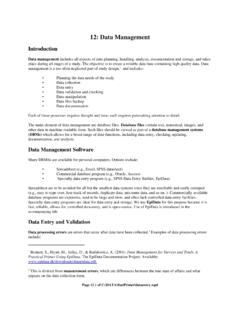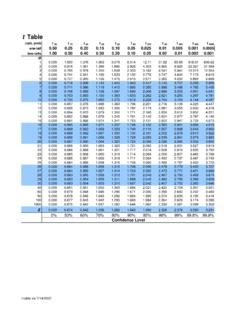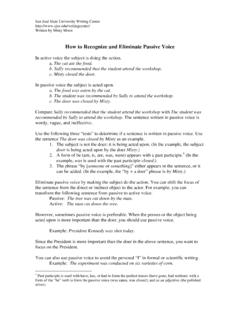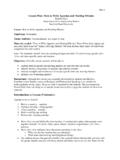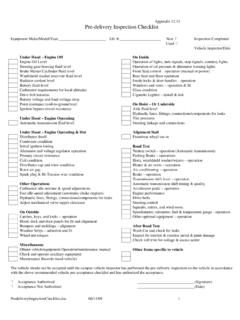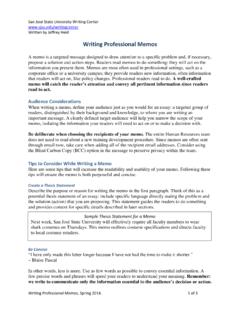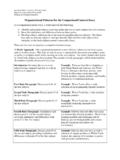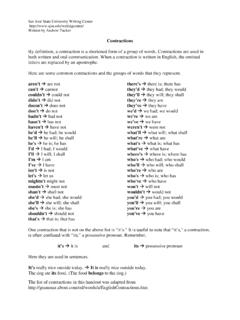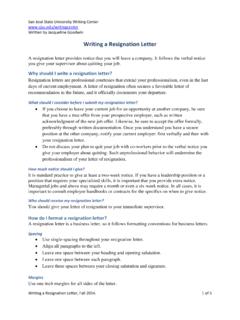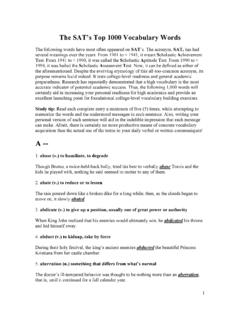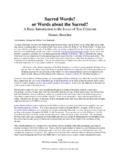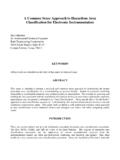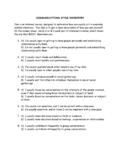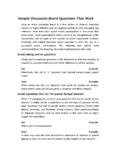Transcription of Choosing Precise Words
1 San Jos State University Writing Center Written by John Linford Choosing Precise Words , Spring 2015. 1 of 5 Choosing Precise Words To choose or not to choose the Precise word: often that decision means the difference between funny and not funny. Example 1: A man walks into a bar and says, Ouch. Notice how the word bar here relies on two separate meanings. On first impression, the word bar refers to a place where one can purchase an alcoholic beverage. However, ouch shifts the meaning of bar to something similar to a pole. The play on the word bar makes this statement amusing.
2 With more Precise word choice, this pun fails. Example 2: A man walks into a pub and says, Ouch. In this case, the pun no longer works because the word pub refers only to a place. This pun only functions as a joke if we choose the word bar, which has a double meaning. Now that a more Precise word is used, the pun does not have the appropriately funny ending. Imprecision is the source of many great jokes. However, not all writing aims for such humorous effects. Most often, Choosing the Precise Words determines not only what your sentences say but also how your writing reads.
3 Words have the ability to change the tone and feeling of writing as well as the bias of the audience. Fortunately, resources such as dictionaries and thesauri exist to help you find the Words you need. Observing the Effects of Imprecision In formal writing, imprecise Words can alter the meaning of your points. For instance, using can instead of will completely changes the strength of your point and detracts from the possibility of success: I can earn $1 million if I work hard is different from I will earn $1 million if I work hard because in the first sentence, earning $1 million is merely possible, but in the second sentence, it is definite.
4 However, by planning ahead and thinking through your ideas and points, you can select strong Words that describe your ideas and accurately indicate to your audience things on which they should focus. Selecting Precise Words Selecting a Precise word greatly improves the clarity of a sentence. Unfortunately, just like all writing, finding the right word is not a one-step process. Revising and editing your writing is a constant search for the exact word to convey your idea: you must consistently attend to the Words Choosing Precise Words , Spring 2015.
5 2 of 5 you are using. Indeed, each step in the writing process gives you another opportunity to clarify what you mean and hone your Words . Readers use Words to identify who is doing the action and what action is happening. Nouns name characters. Verbs name actions. Together they control the core meaning of any sentence. When editing your work it pays to focus your attention on the nouns and verbs that control these focal elements of your sentences. Characters You are writing your status report for your Business Management project. The people reading your work may know the general outlines of the project, but they will have less information than you do as they try to track who is doing what on the project.
6 You will need to use Precise , flesh-and-blood characters as subjects to describe the work completed. For instance, instead of referring to my boss, you might say my manager or my supervisor. Manager and supervisor are more specific than boss. Even more specific would be the name of your boss. On the other hand, the difference between manager and supervisor could be irrelevant to your audience in this report. Part of selecting a Precise word revolves around the detail your audience needs to know. Is the title of your superior relevant to the point you are trying to make?
7 Does it change the understanding of your idea if you use a more general term? Would it help to use the name. Will the audience know your boss by name? It would be simple if we could tell you to always use the most specific word. However, depending on the situation, selecting my boss could work just fine. For instance, if the main point of the sentence did not focus on your boss s management or supervision, but on the relationship between the two of you in the general hierarchy, using my boss instead of a more specific title to indicate her role might work well.
8 But if managing rather than supervising plays a crucial role in a paragraph or sentence, a more specific title would work better because it will locate for your audience the specific Precise relationship on the organization chart in the business. Shown below is an easy way to map out your rhetorical choices for Words as they map onto a ladder of abstraction from general to specific. You choose the best word for the actual audience and context of the writing you are doing. Choosing Precise Words , Spring 2015. 3 of 5 Notice how the bottom of the diagram asks, Is it important to see this?
9 If this is the only time we hear about your boss, or if we are unfamiliar with her name, it will likely suffice to say my boss. In contrast, if your audience knows people by name on this project, it might make sense to use her name so that readers can name the specific actor they will recognize in the role. Similarly, using a more specific title could have the benefit, in context, of showing the importance of the encounter: your CEO recognizing your work is probably more significant to the status of the project than your supervisor doing the same.
10 Actions The actions you choose dictate the tone and feeling of your writing because they control the images we create in our minds. Consider the differences in these sentences. I got an award last night. I won an award last night. I found an award last night. Notice how changing the action word completely changes the meaning of the sentence and conjures a completely different image. Got is not a specific action, so it is not easy to picture exactly what happened: reading got, I could easily picture either won or found, for instance two incredibly different images.
